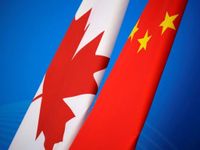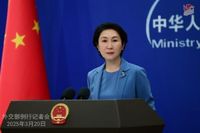China’s recent execution of four Canadian nationals has ignited a diplomatic firestorm, with Canada strongly condemning the actions and calling for respect of legal sovereignty. On March 20, 2025, Chinese Foreign Ministry spokesperson Mao Ning responded to Canada’s outrage during a press briefing, emphasizing that Canada should refrain from interfering in China’s judicial affairs.
Mao Ning articulated that combating drug-related crimes is a shared responsibility among nations. Despite Canada's condemnation, she maintained that Chinese authorities uphold the rule of law and treat all defendants equally, regardless of nationality. “The law treats everyone the same regardless of nationality,” Mao asserted. She affirmed that the Chinese judicial system manages violations of law with strict adherence to its frameworks, thereby protecting all lawful rights.
The executions stem from drug-related offenses, which the Chinese government categorizes as severe crimes necessitating strict penalties. Earlier in the year, Canada’s Foreign Minister Melanie Joly had publicly condemned the executions and indicated that both she and former Prime Minister Justin Trudeau had sought clemency for the executed individuals. Joly has not disclosed specific details about the Canadians due to privacy requests from their families but highlighted these individuals were dual citizens.
“We strongly condemn the executions that did happen against Canadians in China,” Joly said, expressing her deep concerns about the continuation of capital punishment in cases involving Canadians.
Following these events, the tension between China and Canada has escalated further, underscoring already fraught diplomatic relations. The two nations have been at odds over allegations of Chinese interference in Canadian elections and Canada’s apprehension of Huawei executive Meng Wanzhou at the request of the United States, leading to further mutual estrangement.
A spokesperson for Global Affairs Canada indicated that Ottawa continues to provide consular support to those affected and remains steadfast in its stance against capital punishment. Charlotte MacLeod from Global Affairs reiterated that Canada would continue its opposition to the death penalty in all circumstances.
The relationship deterioration has been further exacerbated by economic measures, as China recently imposed tariffs on Canadian agricultural goods in response to Canada’s implementation of a levy on Chinese-made electric vehicles. This move signals a significant reversal in trade relations, once friendly but now strained.
Joly highlighted the unfortunate reality that as of now, about 100 Canadians remain detained in China, many of whom face drug-related charges. Reflecting on past cases, the situation of Robert Schellenberg comes to mind, who originally faced a 15-year sentence for drug smuggling, now upgraded to a death penalty after a retrial. Cases like his only add to the high-stakes dynamics at play between the two countries.
Peter Humphrey, a former British investigator, underscored the alarming precedent set by the drastic measure of executing multiple foreign nationals in quick succession, labeling it unprecedented and a clear sign that China has no inclination to resolve ongoing tensions with Canada. “This is really a strong signal that China has no intention of patching things up with Canada,” Humphrey remarked.
At the heart of the controversy lies the differing views on capital punishment and how it applies in international law. China’s hardline stance on drug offenses correlates with its broader strategy to tackle domestic narcotic issues, although such measures have drawn ire from many nations, including Canada. Amnesty International has commented that executions of Western nationals in China are exceedingly rare; however, this case dramatically diverges from that norm. Given this backdrop, the global community watches closely as the aftermath of these executions continues to unfold.
Ultimately, as the situation evolves, the dialogue surrounding drug policy, legal sovereignty, and human rights is set to transform amid intensifying conversations about international norms and responsibilities. The fate of many individuals held in similar circumstances hinges on the outcomes of these high-profile cases, illustrating the pressing nature of the diplomatic and legal conversations that are now more urgent than ever.








